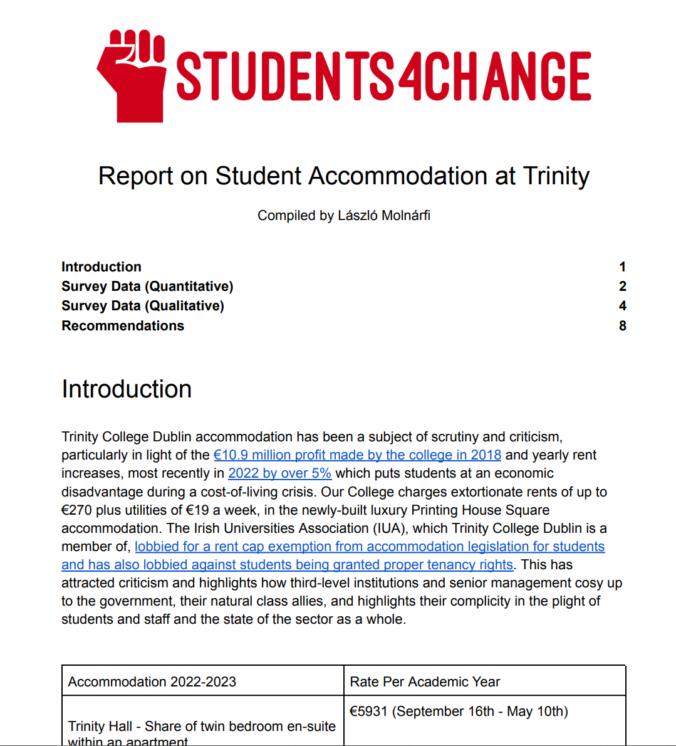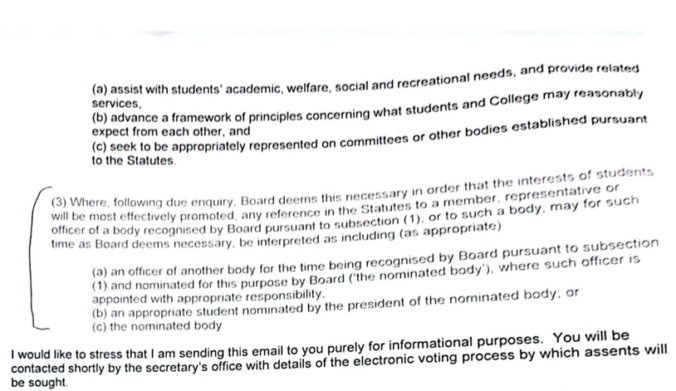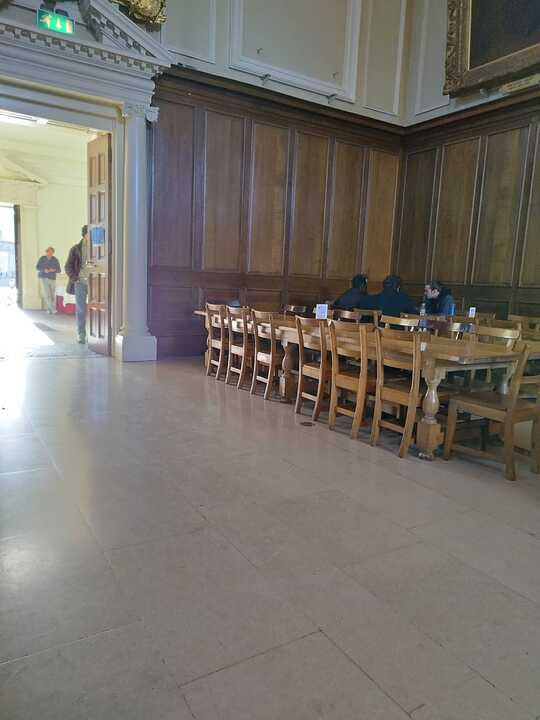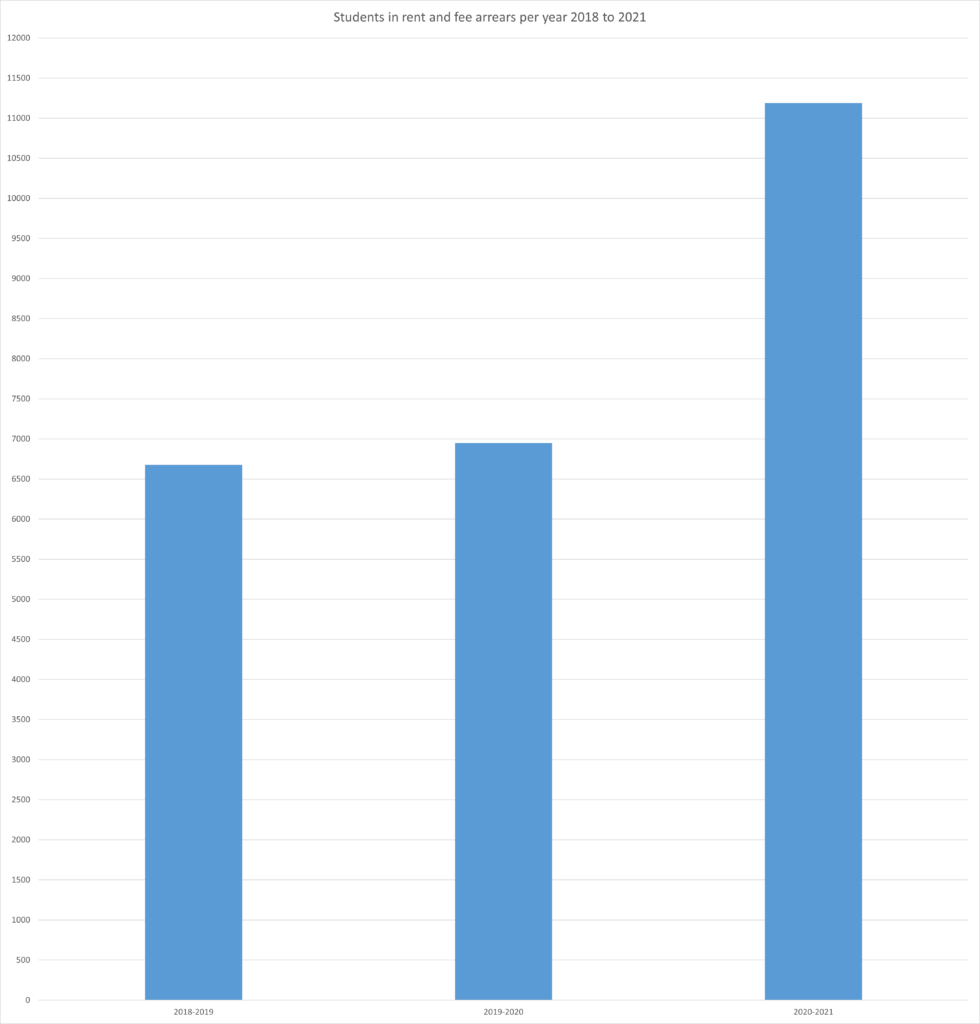Sources for the answers to the following 38 questions can be found here.
What is the HEA Bill 2022?
The HEA Bill 2022 aims to alter the relationship between the state and third-level educational institutions and replace the 1971 HEA Act.
Who is pushing the HEA Bill 2022?
Minister Harris, Senator Malcolm Byrne, Fianna Fail, Fine Gael and the Greens are behind this bill and in support.
In broad terms, what is the issue with this bill?
The strategic plan of the government for third-level education is abysmal. Firstly, there is no commitment to reducing the student fees as the USI pointed out. Secondly, the funding is less than half of what our universities need as per the 2016 Cassells Report. Thirdly, the plan comes with strings attached through the HEA Bill 2022, which is essentially a government takeover of academia.
Not only does the plan not include a reduction in the student fees, the state is taking over academia. In the over 144-page bill, the “Minister” is mentioned 373 times. He holds sway over universities’ equality policy as per (62) (4), as he and his cabinet have to be consulted when preparing the equality statement of universities. The same cabinet that is gifting away the National Maternity Hospital to the church will now hold this power. Him and his board approves the budget of universities, and can withdraw funding as a penalty. The same neoliberal government that has decimated funding for our universities will now be able to control its finances, as also recognized by IFUT, the trade union for academics across Ireland.
Within universities, the HEA Bill 2022 is a power grab by bureaucracy over students and staff. On a national level, the HEA Bill 2022 is a power grab by the HEA over universities. The changes to the governing bodies of third-level institutions are perhaps the most worrying aspects of the bill, due to their effects on all members of our community. Trade union, staff and student representation will be shrunk in favour of state, corporate/external and university leaders on the governing bodies of our universities.
If I am a student or a student union, why should I care?
From certain institutions, such as Trinity, one student representative will be removed from the governing body as in the new proposed legislation their numbers are fixed to 3 instead of 4, reducing the current representation and hampering future expansion. The bill also does not guarantee that student representatives are elected to governing bodies of higher-education institutions, instead they could be handpicked or otherwise appointed without mandate, and not even be from the student’s union. All throughout the bill, the student union can be disregarded (e.g. with the strategic development plan) since wording is that the students or the student union need to be consulted. Furthermore, all power is vested in the institution or in the Minister to recognize the student unions.
There will also be a smaller-sized governing bodies, with a bigger share of corporate/external, state and university leaders on them, rather than students, staff and trade unions. All of this will lead to decisions adverse to students, such as fee hikes, rent increases and the cut of vital services, to being met with less opposition and able to pass quicker.
If I am an academic, professional staff or a trade union, why should I care?
The Minister will handpick 3 ministerial-appointees on governing bodies of universities, and a further 7 external people will be selected by the governing body in accordance with a policy set by the governing body that he “approves” (73) (4) and (90) (3) and (109) (5). The same academic voices who are now dissenting will be finally muzzled, and academic freedom impacted, due a bigger overall share of state-appointed (3), external members (7) and university leaders (1) on governing bodies. There will be a subsequent shrinking of internal staff representatives and trade union to 5, and student representatives to 3, as a fixed limit. There is no guarantee, however, that any of the 5 of the internal staff representatives will be trade union representatives, non-academic staff or indeed academic staff at all, since they could all be senior management – the 5 are referred to merely as “internal members” in the legislation for universities under section 73, with a definition that includes anyone remunerated under a contract with the university, and not further refined to require academic staff/non-academic staff/trade union representation. In the case of Technological Universities in section 90 and Regional Technical Colleges in section 109 this is better refined that 5 must contain elected academic staff and elected non-academic staff to sit on the governing bodies, but no trade union representation is explicitly guaranteed either.
All of this will lead to decisions adverse to students, such as pay cuts, pensions cuts and increased casualization, to being met with less opposition and able to pass quicker.
Compared to the current 1971 HEA Act, what flexibility do universities lose with regards to the composition of their governing bodies?
Previous to this bill, institutions had freedom to include more internal staff, trade union and student union representatives to their governing bodies, which means more diversity and democracy, not to mention better-performing universities as best practices from around the world shows. The Universities Act of 1997 set out one chief officer, one chairperson, maximum 2 other senior management staff members, not more than 6 academic staff who are Professors or Associate Professors, not more than 5 other academic staff, not more than 3 non-academic staff, not more than 3 undergraduate students, and 1 postgraduate student, putting the total at 3 senior management, 11 academic staff, 3 non-academic staff and 4 students. There are also allowances made for special interest representation like trade unions, provided a minimum of 20 but not more than 40 people on governing bodies in total.
Don’t senior management dominate our institutions already, and passing these adverse measures to students and staff?
Yes. However, the solution is not a state takeover of academia. It is building student-staff grassroots community power from below.
Furthermore, the provisions of this bill will further accelerate the decline of Irish society and academia into a neoliberal abyss, much like what has been happening in the U.K.
Is there a danger that an even more right-wing government, if they ever come to power, can exploit the bill?
This is certainly a core issue. There is also a certain vagueness to aspects of the bill. What constitutes “good governance” under section 38, conditions of funding? What will “serious deficiencies” in compliance with the frameworks look like as per section 40, as judged by the CEO of the HEA? The powers of the Minister, the cabinet and the state are too broad, too wide and unchecked in the bill.
If I am a parent or family of a student, why should I care?
As the cost of education has increased, 11,189 students and their families have fallen in arrears during the Covid-19 pandemic across Ireland. This number was obtained following 33 Freedom of Information (FOI) Act 2014 requests to all third-level institutions in the Republic and the North of Ireland. The responses we received indicate a 67% increase in fee and university-owned rent arrears from 6,678 in 2018-2019 to 11,189 in 2020-2021. With the cost of living crisis, the housing crisis and the cost of education, the situation will only get worse if the government and senior management get their way. Universities will be further corporatized and fees, rents and the cost of college will only icnrease.
If I am a postgraduate taught or researcher, why should I care?
Postgraduates will be amongst the first to be targeted in terms of pay cuts, more casualization and more exploitation. The changes to the governing bodies of universities will mean such proposals will be met with less opposition. This will lead to a further decline in working conditions for postgraduates, who are already facing severe academic precarity.
Isn’t more external voices a good thing for universities, able to bring in fresh perspectives?
In some cases, yes, but this is an overwhelming share of non-community members. Selection biases for external members will lead to group-think and corporate-leaning appointees, in other words those selected for governing bodies who already fit in, leading to those dominating these decision-making bodies who are not keen to upset the apple cart. There needs to be a balance but this balance has not been struck in this bill.
If I am a local government authority or councilor, why should I care?
The loss of local councillors and other representatives on governing bodies – such as in NUI Galway – also poses an issue, as it reduces democratic input into universities, and is part of a long-standing tradition of centralizing power in Dublin.
As described in the land-related question, there is also the risk that the central government will be able to bypass local authorities in questions of area development, construction and sale of properties.
What about students’ union autonomy?
There is an email circulating with regards to Minister Harris’ reply to an amendment about student union autonomy to the HEA Bill 2022, which was rejected.
It was sent to the Union of Students Ireland (USI), who asked for this amendment.
Minister Harris claims that section 143 will be used to guarantee student union autonomy, in other words the HEA can use its power to issue “guidelines, codes and policies” for this. What Minister Harris is saying in this email, is that not only will we take away universities’ autonomy with section 143, but the protection of students’ union autonomy will also be at the whim of the HEA. This is not in any sort of framework or legislative solution to the idea of student union autonomy, which Minister Harris later admits in the email, saying that “these issues are not directly addressed in the new legislation”. It is furthermore unclear how student unions not affiliated with the USI, like UCDSU, will be able to raise their issues with their universities.
What about the “student partnerships” within the bill?
Once again, the “partnership” this bill promotes is the corporate one, also known as “commodified dissent” for example through the NsTEP program or StudentSurvey.ie. In the U.K. the NUS is boycotting the StudentSurvey.ie equivalent, the National Student Survey, due to concerns that it leads to the corporatization of universities. They can make as many surveys but these will not stop the rising cost of education as they relate to wider socioeconomic factors. Those factors can only be challenged on the streets. What will surveys do if students are struggling to pay for groceries or pay rent and not become homeless?
These surveys fit well within the KPI-centric, corporate and capitalist ways of measuring universities’ activities, like league tables, as part of the corporatized university. It is to note that the new powers granted to the state allows it to possibly tie funding packages to the StudentSurvey.ie, which is exactly what happened in the U.K., and pit the sector against each other in meaningless categories.
QQI is also mentioned, which only cares about quality of education insofar as the bottom line, how financially viable the way institutions run their courses is. Training of student representatives on the governing bodies of universities is also a feature of this bill. This does not answer the question of student union autonomy, and furthermore, this sort of training fits well into the service-provider, KPI-centric and neoliberal student union, wherein everything they do has to fit into the labour market and be respectable and professional.
We would also fundamentally reject that any bill which cuts student representation can be considered a partnership. Student representation will be cut from 4 to 3, as previously described, which is an improvement on the originally proposed 2 but it is nevertheless a cut in the financial aftershock of a pandemic. There are 245,000 students in Ireland, and their voting rights will be diminished with the HEA Bill 2022. A democratically elected TD is putting forward legislation into the Oireachtas that is reducing not just student representation, but also staff and trade union power.
What about funding for mental health?
The bill itself does not contain any provisions for mental health funding. The “Student Mental Health and Suicide Prevention Framework”, already published in 2020 October will fit in to provide for it under section 37 of the legislation. However, in line with government policy of consistently targeting mental health funding during austerity and beyond (2012, 2016, and a general continued sharp decline in the health budget from 16% to 6% over decades), we do not think the government will do anything differently and step up under the new bill. A commitment in the HEA Plan 2022 to the demands of USI Budget Submission 2022 would be welcome, which stated a need of 28 million euros to provide adequate care across Colleges. The government provided 5 million euros instead in the budget.
This is in response to some wondering if the government might be better at spending money on student and staff welfare supports than the greedy senior management of our current institutions.
Aren’t universities wasting taxpayer’s money, constantly wanting more and never being satisfied?
Firstly, the seemingly money-hungry universities is a symptom of decades of government under funding. It is a crisis that the government themselves have created, and are now stepping in as saviours to fix it, according to academics. They will not. They will further push their disastrous neoliberal agenda down our throats.
Secondly, academia and science cannot be measured in terms of value-for-money. Many times, great discoveries come from chance, whereas millions of euros spent on research might turn up nothing. We should leave space in society for such wonder and exploration.
Thirdly, it is not exactly clear what our institutions are supposed to be guilty of, when it comes to questions about the quality of our degrees. Accountability, cited by proponents of the Bill, depends on the international standing of Irish degrees and awards, the international research and standing of Irish academics and graduates and the international external examiners who validate the courses and awards of Irish institutions. All of these factors are highly regarded abroad. There is no crisis requiring that the HEA Bill be revived on September 14th, so early and rushed. The crisis that the government should be focusing on is the cost of living and that of accommodation. Furthermore, there was no extensive consultation, due to the pandemic, on the bill, and therefore there is a democratic deficit. This bill should be debated on every campus, line-by-line. Finally, The accountability of the sector for finance is covered by Article 33 of the Constitution as functions of the Comptroller and Auditor General. The issues that arise, such as university management’s greed, need to be dealt with on a local level.
Isn’t it a good thing that the USI gets to sit on the HEA Board?
The USI has been promised that they will now sit on the HEA Board, but it is just one vote against a lot of apparatchiks provided for by the Minister who will always vote against student interests. When have they ever listened to the USI in committees? Furthermore, it is not actually set down that the no. 1 nominated student of the USI will be on the HEA Board. As per section (16) (2) (b), one of the members appointed to the HEA Board will be from a nomination of a student from the national student union. However, they can be rejected. The 12-member HEA Board will be appointed by the Minister as per section (16) (a), and so it is his Board, and he will control its direction and fulfil the aims set out in section 8 and 9 (e.g. equality, diversity and inclusivity). The spirit of these aims will be controlled by the government and will not be fulfilled. Equally for all other matters as outlined here where the HEA’s scope of power is extended, the Minister is influential as he appoints the members of the HEA Board. The HEA Board is by no means democratic, and does not guarantee democratic representation for trade unions, students and staff.
What extra powers does the Minister and the HEA gain with this bill?
- The Minister will be able to appoint the 12-member HEA Board, including approve or reject the national student union’s representative (16) (a). This board fulfills the aims of the HEA, including its committment to equality, inclusivity and diversity (section 8 and 9).
- The Minister will handpick 3 people on governing bodies of universities, and a further 6 will be selected by the governing body in accordance with a policy set by the governing body that he “approves” (73) (4).
- The Minister and his Board can set the funding conditions for universities, including “use the funding in a cost effective and beneficial manner”, “operate according to standards of good governance,” and comply with the “guidelines, codes and policies” that they issue (Chapter 2, (37) and (38)) under section 143. If an instiution fails to abide, the conditions of funding may be revised, funding may be withheld, or the institution may be told to repay funding. Section 38 (b) also allows the CEO – appointed by Board with Minister’s consent ((25) (2)) – of the HEA to set any other conditions for funding, with the Board’s consent.
- The Minister can ask the HEA to prepare “guidelines, codes and policies” for “the implementation of any policy or objective of the Minister or the Government” that will be applied to HEIs under section 143.
- The Minister appoints the appeals board for the decision to witdhraw funding, as per (69), so it is not an independent body.
- The Minister and his Board can use Section 143 which gives power to issue “guidelines, codes and policies” to HEIs, on which the HEI must report progress to the HEA on.
- The Minister and his Board can use Section 35 and 36, to dictate the development and focus of universities with “performance agreements”.
- The Minister (and his cabinet if the Minister so wishes) will hold sway over universities’ equality policies due to needing to be consulted about equality statements (62) (4).
- S. 107, s. 108, s. 118, s. 9 (s) combined with the powers to set additional funding conditions as set out in (S38(2)(h)) poses concerns that the Minister will now be able to control land acquisition and disposal of universities
Here is a diagram of the above.
Which Senators have opposed this bill?
All six university senators including Senator Michael McDowell, Senator Alice-Mary Higgins and Senator Gerard Craughwell opposed this bill. The university senators have all proposed amendments. Their constituencies have 180,000 voters. However, these amendments have been rejected by the government.
What have universities, the IUA and other institutions said about this bill?
Students4Change and the Graduate Students’ Union of Trinity lodged an FOI request to Minister Harris’ Office as we felt that there was not appropriate stakeholder consultation across our College. The agenda of his office and tone of Minister Harris we deem unacceptable upon inspecting the documents we received. Insisting that the bill follows the principle of “Comply or explain”, the words written by Minister Harris in reply to the IUA in document n. 18 and 19 sums up his attitude to the autonomy of the higher education sector throughout this bill. The bill has numerous detractors. The 23 documents we received include UCC and Maynooth calling the bill a “command and control” over universities, the IUA saying that aspects of the bill do not “accord with natural justice and will prove unworkable”, and universities raising concerns that state control will lead to reduced EU funding.
Why would this bill lead to reduced EU funding?
As raised by UCC, the HEA Bill 2022 under EU rules might reduce the overall capacity of the state to borrow, resulting in a weaker financial position for universities, if Eurostat assesses the proposed restrictions amounts to government control.
There is the real risk if the state exercises greater control of the education sector
through this legislation there would be a real risk that existing loans of institutions would be cast onto the State balance sheet. Seven institutions have debt of close to a billion euro that could be affected in this way. Such an overstep must be avoided as it could hamper the ability of universities to borrow in the future. The quest for accountability cannot lead to micromanagement of the education sector.
What has each political party said about this bill?
The government is in a weak position right now due to political developments (SF Victory in the north, housing crisis and National Maternity Hospital to name a few…) and so the time to raise our voices is now. There is political support for challenging the HEA Bill, ranging from Labour, PBP, Socdems to independents and even Fianna Fail it is rumored. Calls for a general election intensify by the day.
FG has only 10% opinion poll support among under 35s.
At what stage is the bill, and is there still hope to stop it?
As of the latest developments, we, TCDSU, TCDGSU, NCADSU, NUIGSU, DCUSU and UCDSU have all attended the Seanad sittings and through keeping up the pressure managed to stop a guillotine on the bill but it is due to make its way back into the final stage of the Seanad in September and so we need all hands on deck.
The bill will be back in the Seanad in September at Report Stage. If we mount enough political opposition, it is possible to defeat this bill. We need to organize as quickly as possibly and with as many people as possible, and this is also why we created this FAQ page, to spread the word.
How exactly will governing bodies change?
Our governing bodies will become less democratic, less diverse and less dynamic, with increased chances of group-think.
Please consult our graph here.
How exactly will the HEA Board change?
In the HEA Bill 1971, the 19-member HEA Board is mandated to contain at least 7 academic members. This is missing from the HEA Bill 2022. This could have acted as at least a minimal safeguard against corporate appointees pushing the marketisation of our education.
Please consult our graph here.
Aren’t governing bodies of universities and other institutions clunky, slow and too big for effective governance?
International practice shows that diverse governing bodies ensure the best-run institutions.
What does it mean when we say the philosophy of this bill is that of commercialization?
The centralization of power in the hands of the state should be of extreme concern to anyone who respects democratic principles.
It is a joke that a Minister is asking a democratic parliament to reduce democratic representation on governing bodies. Bureaucrats wrote the bill, with their corporate reasoning of “efficiency” and “competency”, to reduce governing bodies and tip the balance towards those who are not keen to upset the apple cart. The real bliss of this bill for bureaucrats will be that no more awkward questions will be posed at governing body meetings. The bureaucracy that will be dealing with will transform our universities into businesses, and what we will see is that subjects which make no money will be stripped, and further on we go into the neoliberal spiral. There are some competencies you cannot measure, like compassion.
This bill is an affront to our constitution and to our values, and must be opposed with the utmost vigour. As the bill stands, the state has the capacity to underfund third-level institutions, then take them over via appointments to the governing bodies. This facilitates the imposition of an austerity regime — pay cuts, courses stopped, fees increased — knowing that the weakened staff, trade union and student voice will struggle to dissent. The situation is appalling. We appeal for help from students, staff and workers; trade- and student unions; societies; political groups on- and off-campus to oppose the government takeover of academia and the weakening of democracy with the utmost urgency. It is only through leveraging student and worker power in a collective and grassroots manner that we can defeat the government’s anti-democratic legislation.
What does it mean when we say that the HEA Bill 2022 is a possible move towards a U.K.-style situation for academia?
The HEA Bill 2022 is a move towards a U.K.-style environnment for academia. What is happening is that the government is coming in, underfunding academia, and then will impose an austerity regime with their now-expanded powers. It is the height of the corporate fever to think that the way our universities are run has to do with not enough oversight by government officials, when in fact the failure of our institutions to meet targets simply comes from the decades-long underfunding of academia by the state. This is the same underfunding that has corporatized our institutions into for-profit companies. With the government only committing to half of what the 2016 Cassels Report asked for the sector, the situation will not improve. Precarity will increase, welfare supports will continue to not be funded and the logical conclusion of underfunding is that student loans might be introduced in the future, despite government promises. The neoliberal university is the same everywhere.
What have students said about the bill?
The USI, student unions from NUIGSU, UCCSU, TCDGSU, NCADSU, TCDSU and others are dissatisfied. There is an appetite for change. In any case, we need to stand up and make our voices heard and warn people of the impending catastrophe that will affect third-level education for decades to come if this bill passes.
An open letter has been issued to government regarding the Higher Education Authority (HEA) Bill 2022 on behalf of Trinity College Dublin Students’ Union (TCDSU), the Graduate Students’ Union (GSU), Students4Change (S4C), National College of Art and Design Students’ Union (NCADSU) and NUI Galway Students’ Union. You can read this open letter here.
Who else has opposed this bill?
Please consult the government’s consultation. Upon inspecting the documents, it becomes clear that individuals, groups and organizations from across the sector oppose this bill. No one is happy with it.
How is the bill tied to the wider funding plan for the third-level education sector?
What is happening is that the government is coming in, underfunding academia, and then will impose an austerity regime with their now-expanded powers.
Students and staff on the ground will be the most affected. The government promised no student loan system, but they cannot be trusted. They are playing the long game. Now that they will control academia, their policies cannot be stopped. We will be pushed to precarity and a situation like in the U.K. could develop.
Who controls the money will control the policy. Small courses will be cut. Programmes will be merged. Academics will lose their jobs. In other words, the corporatization of academia will intensify. This will also affect research, specifically further dwindling of blue skies research is a likely possibility.
What land-related powers does the Minister and the HEA gain with this bill, and why does this pose such a serious issue?
Section 143, the ability of the Minister to issue guidelines, codes and policies to HEIs through the HEA, combined with s. 107, s. 108, s. 118, s. 9 (s) combined with the powers to set additional funding conditions as set out in (S38(2)(h)) poses concerns that the Minister will now be able to control land acquisition and disposal of universities.
University land will then be open for capital projects and buildings at the whim of the government since university autonomy is lost. Such a command-and-control structures runs the risk of bypassing local authorities and their sustainability or other development strategies.
I understand that the bill is giving power to the state, but won’t the government officials be better at spending taxpayer money than greedy senior management?
Supposedly there will be more oversight, but it is by the government. A den of thieves, crooks and landlords. The government will be no better than the universities, since both university leaders and the government belong to the same class, the ruling class or the same “club”. In fact, oversight should be done on the frontlines and with non-bureaucratic and truly democratic university governance, not via a state takeover, something that the IUA echoed. If universities were to be de-corporatized, university democracy would flourish and oversight would be provided for via such structures. Apart from the ring-fenced funding which is viewed by some as a positive to restrain selfish senior management barring the above, it is performance framework and performance agreements that pose a huge threat to the autonomy of institutions, as set out in section 35 and 36, essentially dictating the development and focus of universities. It is also Section 143 which gives the HEA power to issue “guidelines, codes and policies” to HEIs, on which the HEI must report progress to the HEA, that is concerning. The IUA has also submitted amendments on that front. Furthermore, the conditions of funding outlined in sections 38 lead to ambiguity around the government’s level of influence, particularly universities’ obligation to “to comply with such other conditions as may be determined, with the approval of the Board, by the Chief Executive Officer.”. Section 143 is also included under section 38, in the conditions of funding.
Section 143 will therefore lead to the control by the state over universities, a form of legislating our universities without the legislation in practice ever having passed a democratic house of the Oireachtas. This power amounts to a state takeover of academia and must be severely restricted. The Minister can ask the HEA to prepare “guidelines, codes and policies” for “the implementation of any policy or objective of the Minister or the Government” (143) (1) (b) that will be applied to HEIs under section 143.
What have the proponents of this bill said in its defence?
Nothing poignant.
Under the FOI Act 2014, 24 documents were released to Students4Change. They concern a webinar held by DFHERIS Officials with Senators, and emails sent to Senators by Minister Harris outlining why their amendments to the bill are rejected and finally one document which is an instruction from Minister Harris to the HEA to prepare guidelines for environmental sustainability.
The crucial point is that in the webinar held 11.07.2022 (July 11th 2022), DFHERIS Officials are minuted as admitting that the bill has no protections for trade union, academic staff, non-academic staff or democratically-elected student representatives on governing bodies of HEIs.
Please consult these documents here.
Where can I find the sources for these statements?
Please consult our 17-point briefing document here.
Where can I find further resources?
Please consult our campaign page here.
Where can I take action to oppose the HEA Bill 2022?
To take action on the bill now, please consult the bottom of our campaign page.

















